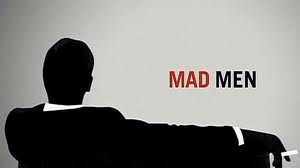 In recent years, one of the only things I have watched consistently on TV is Mad Men. My enjoyment of the show, which takes a nostalgic look back through life in 1960s America through the prism of Madison Avenue ad agency, has diminished through time. It’s not difficult to predicate that the effectiveness of the ad industry, looked at from the basis of return on investment, has also diminished through time.
In recent years, one of the only things I have watched consistently on TV is Mad Men. My enjoyment of the show, which takes a nostalgic look back through life in 1960s America through the prism of Madison Avenue ad agency, has diminished through time. It’s not difficult to predicate that the effectiveness of the ad industry, looked at from the basis of return on investment, has also diminished through time.
In his critically acclaimed book entitled ‘what would Google do?’ Jeff Jarvis argues that a “a marketer’s ultimate goal should be to eliminate advertising by improving their products and relationships instead” He goes on to state that Google’s number 1 rule is to: “Focus on the user and all else will follow” before he begins to question, the whole efficacy of advertising, and asks the following questions of businesses that advertise:
Do you want to tell people who aren’t interested about your product?
Do you want to convince people that a bad product is good?
Do you want to inch slowly ahead of your competitor with massive media spending?
He advances the proposition that mass market advertising is no longer an efficient means for spreading a message. You need to be able to identify customers by relevance not by content of demographics. In a book centred on how Google have achieved such huge success, it is unsurprising that Google, even though a lot has happened in the 2 years since this book was written, are cited as, and remain masters of this domain. I must say that I enjoyed reading Jarvis’s book, if you haven’t read it I would heartily recommend it.
The next ten years will be a decade that brings a heightened level of challenge and innovation for the advertising industry, with the array of media to guide us through our purchasing decisions, changing at an unprecedented level. It will be interesting to see how the ad agencies, home to some of the most creative minds in business, go about adapting to the vacillating terrain?
With tough economic conditions, the continual onslaught new technology, and everything becoming social, those best poised to adapt and capture the marketing zeitgeist shall enjoy great returns for their efforts, Darwin’s evolutionary theory applies to this industry now more than ever.
 One result of this change will be the increasing level of cross over between many disciplines in marketing, not least, advertising and customer experience. The relevance of advertising as we had grown to know it will continue to diminish, but the industry will remain as vibrant, if not more targeted in nature. With that new direction, customer experience, and customer feedback will form an integral part of its new make-up. Even though there is a new dawn for the industry, the title ‘Mad Men’, would still be a fitting label for those who persisted on emptying the war chest on mass market advertising.
One result of this change will be the increasing level of cross over between many disciplines in marketing, not least, advertising and customer experience. The relevance of advertising as we had grown to know it will continue to diminish, but the industry will remain as vibrant, if not more targeted in nature. With that new direction, customer experience, and customer feedback will form an integral part of its new make-up. Even though there is a new dawn for the industry, the title ‘Mad Men’, would still be a fitting label for those who persisted on emptying the war chest on mass market advertising.



